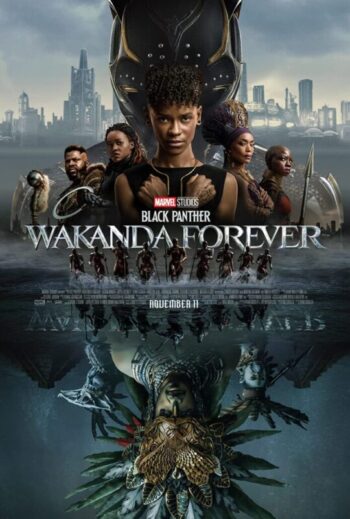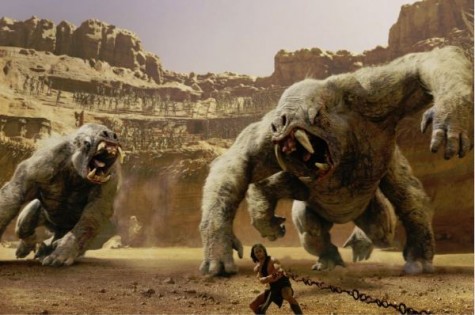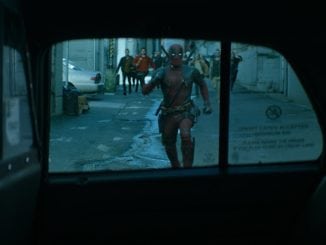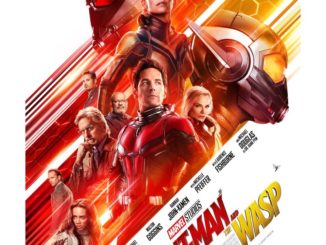Directed by: Ryan Coogler
Written by: Joe Robert Cole, Ryan Coogler
Starring: Angela Bassett, Dominique Thorne, Letitia Wright, Lupita Nyong'o, Tenoch Huerta

BLACK PANTHER: WAKANDA FOREVER
Directed by Ryan Coogler
A few years ago, I began a review with reference to superhero fatigue. In 2022, it’s that and then some. Not even counting the many Sony and DC films, we’re about 30 films, and 20 shows into the Marvel Cinematic Universe, with years of material still to come. At its best, Phase 4 (2021-2022) has given us character-driven pieces that have taken narrative risks and had fun with the now-tired franchise conventions – the strongest being Wandavision by some distance. However, for the most part, it’s felt underdone, aimlessly grasping in the dark for a consistent tone or ongoing storyline. Still, it goes out on a high with Wakanda Forever: the long-awaited sequel to 2018’s Black Panther.
Since the tragic death of Chadwick Boseman in 2020, fans have speculated about how Marvel would address his passing. Other major franchises have dealt with similar losses, such as The Rise of Skywalker and Furious 7, though never a protagonist before the second outing. In a powerful and tastefully done intro, we learn T’Challa has died with Boseman – giving the characters, the actors, and the audience time to grieve the star. A year later, and it’s a complicated time politically. The world’s governments are in a race for Wakanda’s most valuable resource: vibranium. Raids are happening on Wakandan facilities, the U.N. is pressuring Queen Ramonda (Bassett) to share it with the rest of the world, and a detection device is developed by the Americans. However, things get more complicated still when another potential source is found: an undersea civilization called Talokan, led by an enhanced mutant called Namor (Huerta). And they’re pissed at Wakanda for telling the world about their precious metal. Initially, they try and strike a deal with Ramonda to keep them hidden from the surface world. But it’d come at a cost the Wakandans aren’t willing to pay.
Both literally and thematically, Letitia Wright has big shoes to fill as her character, Shuri, takes centre stage. Of the Marvel leads so far, T’Challa was not among my favourites. Boseman was fantastic, and his look was iconic. But where his foil Killmonger was a charismatic revolutionary motivated by righteous fury, T’Challa was a bland emblem of hereditary power. So, for me, the irreverent and fun Shuri is a more than worthy replacement. And while I think some of what made her character so likeable the first time is gone, with the science geekery being replaced by a more sombre story of legacy, Wright commands the audience’s attention. No small feat considering it’s the second longest entry to date. It helps that it doesn’t feel like an almost three-hour film – even though its direction is fairly obvious, there’s always a forward momentum to it. Of course, there are times when it drags. For instance, a subplot with the CIA doesn’t need to be there. And the by-now predictable narrative also means that audiences are way ahead of the plot and will spend much of it waiting for someone to inevitably suit up.
Still, these complaints could easily be used against most Marvel films. Moreover, a lot of what seems like filler pays off later. For example, the long time spent developing Talocan also pays off, enriching the third act with emotional stakes and drama. Like the best franchise villains, Namor has a good backing story and a clear reason for aggrievement. As per Wakanda in the first, his kingdom is technologically advanced yet isolationist and intent on protecting its natural resources from Western imperialism. And while his motivation for fighting the Wakandans falls apart under scrutiny, as Killmonger’s did, he’s still a layered, likeable villain. The secondary characters also get their time to shine, with director/co-writer Coogler effectively integrating the character arcs with the action. Unfortunately, the fights themselves lack the spectacle of earlier outings, particularly the needlessly dark ones in the first half that’ll give Game of Thrones fans unwanted flashbacks to the battle of Winterfell. An approach I can only assume was used to cover up dodgy CGI. Yet their often-scrappy quality gives them a welcome grit and a sense of danger usually missing from these movies.
Thematically, Wakanda Forever doesn’t play it too safe, either. The idea of someone stepping up is almost par for the course of Superhero flicks. Still, unlike the first, the script doesn’t pander with a ‘let bygones be bygones’ approach to colonialism. Instead, its worldview is a little more nuanced, with a less clear-cut morality and an interesting ethical conundrum at its core – even if you can easily figure out which side it’ll come down on. Similarly, the character journeys are also more intimate and engaging, harnessing real-life sadness – it’s rewarding to see how they deal with grief. Finally, series newcomer Dominique Thorne adds some much-needed lightness to proceedings, making her upcoming spinoff Ironheart look like a sure-fire hit despite the teenage tech genius angle being by the numbers and her training getting rushed. Expect to see plenty more of her in the next phase. And on that point, it’s worth reflecting on where we are with these films.
Black Panther: Wakanda Forever isn’t near my top five (Infinity War, first two Spidermen, Winter Soldier and either Iron Man or Civil War). But then, by this point, it’s hard to make something that still feels like Marvel without it also feeling like yet another entry. These films follow a formula, and while Wakanda Forever succeeds in places many lesser sequels have failed, it is ultimately more of the same. The three-act structure has many of the same beats we’ve seen over and over again, and for the most part, it’s as streamlined as the last few. As such, if you’re really bored by this point then chop the half star off the score below. Perhaps this is inevitable for long-term, multimedia franchises, and I can easily see Star Wars going the same way. Especially if it sticks to a similarly busy release schedule. Still, while they’re able to reach this kind of quality semi-regularly, I guess one could say, ‘if it ain’t broke, don’t fix it.’ Especially on a horror site where we wouldn’t hold slashers to anything like the same standards for originality. Also, there’s at least a four month break before the next – Antman 3. In Marvel time, that’s almost a year.








Be the first to comment